
STAR TREK:
- The Original Series (TOS)
- The Animated Series
- The Movies
- The Next Generation (TNG)
- Deep Space Nine (DS9)
- Voyager
- Enterprise

THE ORIGINAL SERIES:
- Season One
- Season Two
- Season Three
- "Season Four"
Season Two:
-30: "Catspaw"
-32: "Friday's Child"
-33: "Who Mourns for Adonais?"
-38: "The Apple"
-39: "Mirror, Mirror"
-43: "Bread and Circuses"
-45: "A Private Little War"
-46: "The Gamesters of Triskelion"
-49: "A Piece of the Action"
-52: "Patterns of Force"
-54: "The Omega Glory"
-55: "Assignment: Earth"
-Season 2 Rankings

SCIENCE FICTION:
- Doctor Who
- Sliders
- The Matrix

- Main Index
- Site Map
|
The Rise of the Prime Directive
"Be the change you want to see in the world."
~ Mahatma Gandhi, 20th century Indian spiritual & political leader
|
|
|

Season Two (1967-1968)
Season Two is the true original hey-day of the Prime Directive
in Star Trek. So far, there have only been mere inklings
of the Federation's greatest law in
Season One, but this cornerstone of Star Trek philosophy
will soon define itself and be used more in season two than
anywhere else in original Star Trek.
Friday's Child
(Star Trek story #32 in production order)
written by D.C. Fontana
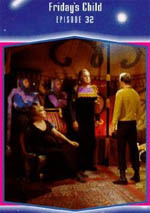
|
This slightly mad-cap action tale provides one of the earliest
arenas for one of the aspects of the Prime Directive. In many
ways, this story is simply a modernization of the typical
western action show, with the inhabitants of the planet
Capella 4 substituting for Native Americans, complete with
teepee camps, tribal chiefs, and the cliché misconception
of their love of the warpath. Lots.
Of course, the Starfleet and Klingon characters appear as the
European settlers did, bringing their advanced technologies
with them and causing considerable culture clash.
And so Roddenberry and crew proceed to go one better than the
typical western show, which would be locked into repeating
bad historical behaviour. Captain Kirk proudly points out one
of Starfleet's greatest selling points to the Capellans: that their
highest law is that the Capellan's world will remain theirs
no matter what else happens. Good show. And it does seem to
be merely a reaction to European vs. Native American concerns here.
|
The Capellans show no evidence of having discovered something
like Warp Drive, and don't seem interested in space travel,
or even the sky for that matter. So one wonders why Starfleet
even allows itself to show up to talk to these people? They didn't
know that Klingons would show up to rival them when they decided
all this, so they can't blame their enemies this time.
Mind you, I think Starfleet should interact, and be themselves,
so good for them.
Perhaps less admirable is the way they wield weaponry in this
story. Both way back when I first saw the story and still now
for different
reasons, I hate to see our characters without their phasers,
having to make do with bows and arrows. Firstly, phasers are
simply much more exciting for special effects reasons. But more
importantly, a phaser can stun an attacking native and allow him
to wake up with merely a headache after the problem of the day is
solved. But Kirk and co. wind up killing many natives with the
bows and arrows they are forced to make, when their aim is to
convince these people of their trade-worthiness instead.
Poor show guys. Have your Directives nothing to say about
that?
"Friday's Child" remains a fun and enjoyable show, with plenty
of satisfying outdoor filming and many humorous moments.
Writer D.C. Fontana gives us some of her trademark moments of
cutting back to a scene to discover that a fight has somehow
broken out while we weren't looking, while composer Gerald Fried
comes up with the definitive musical cues for scoring such an outburst,
what I call the "Loose Cannon Kirk" theme. Classic.
Grossly conspicuous by their absence are any visuals whatsoever
of a Klingon spacecraft, a huge minus mark on the show in my
opinion. Klingons deserve better, but have not had any
spaceship models built for them yet. Sad.
But the Prime Directive has barely got warmed up yet.....
Who Mourns for Adonais?
(Star Trek story #33 in production order)
written by Gilbert Ralston
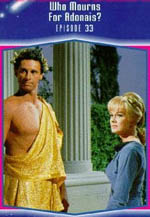
|
This next story makes no actual mention of the prime directive,
but neatly puts the shoe on the other foot. If Starfleet and
the Federation don't want to interfere or even show themselves
to societies on planets that haven't yet learned to come out
and mingle with the rest of the galaxy on their own initiative,
this story is all about what is wrong with that relationship when
aliens like Apollo came to visit us on Earth before we were ready.
Thus is laid important motivational groundwork for the creation
of the Prime Directive by the writers, and a superbly
thought-provoking episode is delivered here. Nice one.
|
The musical score is Fred Steiner's most important new contribution
to Season Two's library of re-usable tracks. His Apollo motif
and power themes capture majesty and inescapable struggle
beautifully, and will be reused countless times afterward,
while his own re-use and re-recording of his prior themes
like Kirk's Command from Charlie X are welcomed and celebrated
by the ear, bringing multi-season consistency to the show.
Nice job.
The Apple
(Star Trek story #38 in production order)
written by Max Ehrlich
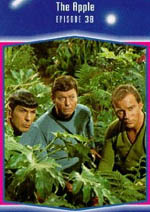
|
This story continues the theme set up in "Who Mourns for Adonais?"
with our Starfleet characters once more confronting the relationship
between primitive people and their god. And the episode features
what is probably only the second mention ever of Star Trek's
"non-interference directive", after "The Return of the Archons".
It is important to note that Kirk and company have orders from
Starfleet to investigate this planet, due to the strange
technological readings acquired by a previous passing ship.
And once they investigate enough to learn something, there
isn't really any way to leave this dystopia as it was without
also letting the Enterprise crash on the planet.
|
Technically, the humanoid inhabitants aren't warping out
to mingle with the rest of the galaxy, but the technology they
support looks as though it's creating a major hazard to
galactic navigation without proper checks and balances
and enough sentient awareness to really know what it's doing.
Just as McCoy makes an excellent case for the
mental/emotional/spiritual/social growth of the local population
that requires them to grow out of their dystopia,
an equal case can be made for Starfleet's social/spiritual
growth if it could grow out of its dystopian view of
applying a non-interference directive across the board.
And Spock's argument that the society on Gamma Trianguli Six
works, doesn't really fly. As the episode amply proves,
it has no capacity for encountering any society outside
itself with any grace or good will, with Vaul acting
xenophobically and implementing courses of action based on fear.
Good riddance. Kirk should not be asked to sacrifice his
ship and crew to sustain this. Let Vaul and company learn
the standards, boundaries and limitations of good galactic
social behaviour, and deal with that as they see fit.
So, as prime directive development goes, here's an episode that
goes far to prove why it isn't such a great idea, and all before
it has even got a chance to prove itself in a proper episode.
The strangeness continues....
One last word regarding the identification of the planet:
It is a nice touch to see Bayer Notation being used properly
instead of just hearing numbers and Greek letters thrown about
carelessly as often happens in other episodes.
Gamma Trianguli is a real star that you can find in your charts,
making it easier to believe in a fictional sixth planet orbiting
around it as the setting for this story. Nice.
Bread and Circuses
(Star Trek story #43 in production order)
written by Gene Roddenberry and Gene Coon
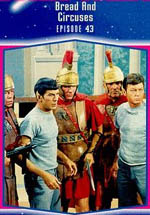
|
At long last, the Prime Directive comes out of the back pages
of shelved scripts and series bibles, and gets revealed in
a full blown story to the rest of the production crew.
I say to the crew, because this story was subsequently
pushed back to the very end of season two for first broadcast,
which allowed other Prime Directive stories to get aired first,
a move repeated on recent DVD full season box sets. Bizarre.
Anyway, this first true prime directive production puts the dubious
law ahead of honesty and good taste. Indeed, honesty proves
it would have been a better guide for handling the story's
challenges than the Prime Directive, although the attempt
here has some nobility. In fact, the whole thematic point
of the episode seems to be whether or not the Prime Directive
is a good idea. Let's dig in and see...
|
The Enterprise crew get into this adventure hot on the trail
of a ship that came before it - an often used sci-fi plot device
for creating mystery and raising both questions and stakes
early on in a narrative. In Star Trek's case, this often means
our characters are boldly going where someone else has gone before,
but the device still works well enough that audiences either
don't notice it, or forgive it easily.
In this case, it may be interesting to note that the ship in
question is a survey ship called the S.S. Beagle, commanded
by a Starfleet Academy dropout who later "went into the
merchant service". I bring this up in an attempt to
determine exactly how far-reaching the jurisdiction of the
Prime Directive is in Federation society, if indeed the
Beagle is not a Starfleet vessel and does not have a Starfleet
crew.
Bizarrely, only after our favourite trio of Enterprise crewmembers
beam down do they brief themselves on the idea that the Prime
Directive is in full effect, and proceed to list the truths that
they are not to divulge to the locals. I'd prefer to merely
refrain from advertising such facts without shying away from
standing by the truth under direct questioning, but seeing as
how Kirk and company need to find out what happened to the
group of space travelers that came before, it's not really
practical to avoid the subject.
It's also too late for our trio to change out of their normal
uniforms and disguise themselves in local garb as they often do,
but I think I like them better when they dress honestly like this.
And this seems to be the first time that their law is actually
called "The Prime Directive", instead of the
"non-interference directive" as has happened twice previously.
Dr. McCoy's idle ramblings shortly after make the mind reel.
WHY would he fantasize about claiming to be a holy figure
like the arch-angel Gabriel, broadcasting loudly such a false
claim to a local population? If this is the terrible,
culture-corrupting lie that the Prime Directive was designed
to prevent, why should such prevention require more lies that
attempt to manipulate the situation in the opposite direction?
Why don't they just stick with honesty and avoid both bad
situations?
And needless lies come thick and fast out of the mouths of our
Starfleet trio shortly after. Instead of giving their names,
they answer the question of "who are you" with invented geography.
Kirk later follows this by saying that his ship is out at sea.
What good this does them is unclear when they later have to dig
for information about the Beagle crew, and press on asking if
there are any legends of people coming from the stars, and
they receive as much confusion as they give, as this dovetails
seamlessly into the whole sun-worshipping red herring.
Hodgkin's Law
Kirk's first Captain's Log entry for the episode, nicely delayed
until it was actually needed, mentions something called
"Hodgkin's Law of parallel planet development", a nice label
to both give some believability to the coincidences of discovering
a large number of planets resembling some point in Earth history
throughout the rest of this season, and also to provide extra
backbone to the whole "Prime Directive" philosophy, namely
the idea that because we believe we turned out so well by
not officially encountering any aliens before we were ready,
these parallel planets will develop best if we ensure they
never register our alien presence before they are ready.
Personally, I think we Earthlings were very much affected
politically and religiously by beings whose honest heritage
was obscured by both their need to control, and our need to
be in awe - and that the episode "Who Mourns For Adonais?"
nails the issue much more effectively. Too bad McCoy didn't
remember Apollo when he made his Gabriel remark earlier.
While I like Hodgkin's parallel planet theory in itself, in that it
allows our Star Trek characters to interact with situations
normally found in sci-fi time travel stories yet without
tying up our characters' options in historical foreknowledge
or re-run plot loops or any of the other common choice-draining
idiocies, the Prime Directive often comes into play as well
in these cases and creates almost the same thing, although
typically not as badly.
It's not long before our trio from the Enterprise perform
a little costume switcheroo, although any reasoning behind
their new choice is muddled indeed. Why would they want to wear
the grey T-shirts with the 3-chain-links symbol, which seem
to denote a person of the slave class? Surely there are better
choices in "20th-century Rome" that won't get them stopped
at first sight
so that they might investigate freely. Even if Septimus and
Flavius can't provide anything else, their everyday Starfleet
uniforms would arouse less disciplining from common guards
and possibly attract people who know something about the crew
of the Beagle.
There is a nice bit about "Roman" slavery evolving into a
semi-comfortable institution... nice because our own
economic development isn't actually as far from that idea
as the Starfleet characters seem to believe, and it makes
one wonder exactly where Roddenberry and Coon's beliefs
were when they wrote this choice bit....
By far, the biggest blow against having the Prime Directive
govern Kirk and company's moves during the subsequent action
plot is the fact that the head of the local government,
the manipulative Proconsul Claudius Maximus, is fully aware of
who and what both Federation crews are, and he constantly
flaunts this knowledge in full view and earshot of his
numerous armed guards. It seems to me Kirk would be within
his rights to use any sci-fi device at his disposal to
render the lot of them unconscious while making good their
escape.
While much time is well spent in the early portions of the story
detailing the various facets of the Prime Directive and how it
applies to this week's situation, its net effect on the story's
plot structure seems to be as a thorny hindrance, stretching
out the old capture and escape prisoner dynamics that have
become staple padding in science fiction everywhere. Indeed,
shortly after the mid-point of this adventure, it seems the
writers have little territory left to explore, and little
promise of delivering an action conflict that the audience
hasn't already just seen. Spock and McCoy have a character
interaction in their cell which could probably be dropped
into any episode, and would probably best suit a story
centering on Spock's character. Kirk's encounter with the
slave-girl Drusilla equally seems out-of-place for such a late
stage of a story that was about other things. Far too much
is made about our Enterprise trio's inevitable escape back
to their ship. Far more interesting, and bizarre by its absence,
are any attempts to rescue any of the Beagle's
alive, adapted crew or at least get their opinions on the
situation. Emphasis is not where it should be, and the
story does not go down as a great one amongst Star Trek fans.
Last but not least is the final twist of the tale, where it
is revealed that this Roman Empire is not threatened by
worship of the sun in the sky, but the Son of God,
instantly drawing parallels with our own Christian religions.
Perhaps this is meant to take the place of Kirk and company's
heroic opportunities to "fix" this society, while proving that
the Prime Directive wisely guides Federation citizens to let
other civilizations realize their own ways out of their own messes.
Dandy.
At least these "Romans", on their unnamed but numbered planet,
are getting peace and brotherhood out of the idea. Excellent.
But I distrust symbols, as they can be easily usurped for
less noble ideals, and this alien version of "the Son"
is too easily assumed to be an exact parallel of our own
Christian beliefs by the Enterprise crew without any proper
study. One obvious fact they all seem to be overlooking is
that Septimus knows this "Son" to be up in the heavens,
where the stars twinkle. How can we be sure this planet's
religions weren't formed (or corrupted) by some other
ancient astronauts from a previous galactic organization?
How do we know that ancient "Prime Directives" weren't violated
way back then? And if so, perhaps they parallel us too closely.
I point again to the example of "Who Mourns for Adonais?"
Who is to say what really is natural development for a planet's
culture? Interaction with other civilizations is an important
component which I believe is not best prepared for with either
total isolation or "white lie" falsehoods.
Though this episode does a fairly good and important job of
bringing the Prime Directive out of the closet and featuring it
properly enough so that following episodes can finally use
it as a background element should they so choose,
"Bread and Circuses" delivers neither a great episode
in itself, nor a pillar of legal wisdom other than institutionalized
self-doubt for a high civilization. A good exploration of
values and the human condition could well assail this
law and come up with something better. Bizarrely, the Trek
team attempt this next from completely the wrong angle,
and bugger themselves up worse than ever before.....
A Private Little War
(Star Trek story #45 in production order)
story by Jud Crucis and Gene Roddenberry
teleplay by Gene Roddenberry
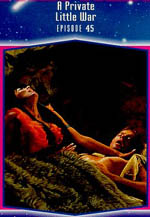
|
This Star Trek episode is probably celebrated far more
for sneaking past the censors to have its spot-lit hour
on a prime-time soapbox
rather than for anything it actually said.
Wading deep into socio-political territory,
it tackles a situation almost tailor-made for the
precious Prime Directive - which actually never gets mentioned.
The closest the episode comes to it occurs during the scene
when Kirk and McCoy beam back down to the planet dressed
this time in local garb, and one of them mentions that
their interference/influence is "forbidden". Normally,
you would think that was because of the Prime Directive,
but the story goes out of its way to say, no, it's because
of a report that Kirk wrote out years ago after first visiting
the planet.
|
This makes you wonder why his earlier mission was allowed to
bypass the Prime Directive and beam down and mingle so heavily
with the local population in the first place! He certainly
made no attempt to disguise his true nature from Tyree, who
later spills the whole truth to his wife in this episode.
Starfleet indeed
has some very inconsistent methods of dealing with its highest law.
But far worse is yet to come.....
This story is split into several very different stages, each of
which requiring its own brand of criticism. The first stage
has our usual Star Trek trio down on the planet surface in their
regular uniforms. Perhaps the most interesting point in this
section is Dr. McCoy's greed as he sizes up the biological natural
resources that this land has to offer. Perhaps this is the clue
to what Starfleet really wants during the episode, rather than
winning any philosophical debates or trying to better themselves.
Another stage of the story is triggered by the presence of rifles
and yet another Klingon ship that the viewer is cheaply
denied any visuals of. Kirk and McCoy make it their mission
to discover if Klingon influence is responsible for the presence
of the rifles on the planet surface. I think the pair have a
legitimate reason to disguise themselves as natives this time,
not because of anything the Prime Directive has to say about
revealing themselves to developing cultures, but more because it's
too early to tip their hand to any Klingons or Klingon sympathisers
on the planet like Apella and his group.
While the episode proceeds through this section, it is largely okay
as far as Starfleet values are concerned, although far from being
great drama or great value for screen time. Tyree's wife Nona
is easily dislikeable, a very obvious manipulator accustomed to
getting her way with weak-minded men. She seems to be doing double
purpose in the story, perhaps partly as one of Roddenberry's
less-than-brilliant fantasies, and perhaps partly as the kind of
passionate, corrupting influence amongst technologically reaching
cultures that easily demonstrates why it is a mistake to give
them weapons that they are not yet wise enough to handle.
The bit about a person not being able to refuse her anything
after the root ritual also feeds clumsily into both of these
roles. Without any kind of bio-chemical backup, as it
appears when it is first said, it seems like a ridiculous part
of local culture that the Starfleet people should not even
slightly feel bound by. Starfleet can give its thanks in ways
that it finds normal instead.
Two-thirds of the way through the story, Kirk and McCoy collect
and record all the evidence they require, and have an interesting
little scuffle with a Klingon and his cohorts to boot. Great stuff.
The following scene has them discussing their options and
philosophies in a cave, which becomes the most major turning point
for the episode's fortunes. First to the debate.
Of the two of them, Dr. McCoy easily has the most sympathetic
viewpoint, and his criticisms of Kirk's viewpoint are sharp
and hit home. Kirk's only leverage in the debate is the challenge
he throws out for McCoy to come up with a better solution.
McCoy may not be up to it, since he's a doctor, not a sociologist,
but a good brainstorming session for that better solution is long
overdue.
Two ideas are key here. One is to stop treating Tyree's group
any different to the group that the Klingons are influencing.
They used to trade with each other; they should do so again.
Nurture that peaceful, progressive side of BOTH parties. Yes,
that means you've got as much work to do with Apella's
rifle-toting
Klingon sympathizers as with Tyree's group or any other.
And note how quickly and easily Kirk comes up with this idea
when faced with a similar problem later on in
"Patterns of Force" (production #52).
The other key idea is this: If you've got a problem with the
Klingons, take it right to the Klingons. Don't drag the ignorant
locals into it with you, or worse let them ineffectively
do all the fighting for you.
Which brings me to the point in the story structure where
philosophical failure is chosen, after the evidence collecting
mission is achieved, and McCoy and Kirk have their debate.
The episode really goes into the toilet after this point,
and never recovers. Natural story structure, as it has evolved
through human myths and legends over thousands of years, prompts
one to feel what our heroes should tackle next. Transmit your
evidence back to Starfleet, then get your proper uniforms back
on, and come out of the closet. Have a proper confrontation
with that lone Klingon in the other village, and don't be
afraid to bring out your phaser and a contingent of security
men, in the red shirts and all. Let the Enterprise confront
the Klingon ship as well, and put a model of their ship on screen
for the viewer already. Shut down the rifle-making operations
on the planet, and confiscate or destroy as many rifles as you
can see.
But more important than any of that, is to be able to confront
any desire the locals may have developed for rifles in the first
place, for if the knowledge of how to make them has been passed
down from the Klingons, the genie may be out of the bottle
irreversibly. The real challenge is to reignite the locals'
sense of pride in their own culture, and emphasize all those
wonderful things that Kirk and Starfleet admired in them in
the first place: their sense of peace, their fairness in trade,
their ability to handle the technology of bow and arrow in
harmony with each other. I can picture a very satisfying scene
of Kirk in proper uniform, speaking to all the locals including
both Tyree's group and Apella's, mocking the arguments of the
Klingon and his offers of quick and easy profit. Let all the locals
reject him and the seeds of distrust and laziness and greed he tried
to sow between them. There would have been the ideal ending for the
episode. And as Star Trek fans are proud of saying, this show
is supposed to be about ideals.
What the episode actually delivers after its major turning point
is an unending succession of drab, pointless, disgusting conflicts
that simply pile more and more rubbish onto the heap. The character
parallels are close enough to then-current events to make even this
work as a kind of negative warning - IF only our regular characters
had framed it that way. But this is all Kirk's choice, and he
sticks by it until the episode ends, after which none of this
foolishness is ever brought up again in further Star Trek episodes.
It's enough to make me want to nominate this as
the worst original Star Trek episode ever.
If we are to take a warning out of it in spite of the framing,
it is probably good to note that Tyree is indeed a weak character
all the way through, with a developing case of passive-aggressive
syndrome.
He never really does demonstrate any of the high values that
Kirk reportedly admires in him. Kirk (and possibly the writers
as well) may be making the mistake of equating peace with passivity.
Tyree never shows any great leadership or ability to resolve
conflict. Instead, he is shown to be easily manipulated, most
often by his wife. He balks from conflict, unsure of himself,
and runs away. This is no noble restraint. When too much of
this negative pressure has built up inside him, he snaps and
lashes out, as in the end. True peace requires
conflict-resolution, which stems from proactivity.
Passivity, on the other hand, usually leaves conflict to
fester under the surface until it can't be held in anymore.
Tyree has gained no inner strength at the conclusion of this
episode; he has merely allowed himself to be manipulated once
again, this time by Kirk and circumstance, and he may have become
more deeply locked into this condition by now.
Nona also demonstrates her weakness loud and clear,
seeking power over others through others, but having no clue
how to directly show her own strengths. Even with Kirk's
phaser clutched securely in her hands, she fails to even
ATTEMPT to fire off a single shot when a long and drawn out
attack from a group of Apella's riflemen ensues,
preferring instead to beg her attackers to let her make
a bargain with their leader for its power. She at least needs
to demonstrate the phaser for them, for goodness sake. These guys
have never seen such a thing before. The idiotic writing
here makes the mind reel.
And sadly, nowhere on this planet have we seen any locals
any further up the scale of wisdom.
It all makes one wonder what the real point of this adventure
was supposed to be? If it is merely thin justification for
America's involvement in Vietnam, I don't think it really
came close to achieving it. Perhaps it is a criticism, but
hardly an effective one without more strongly deterring Kirk's fans
from following in his footsteps and/or supporting similar ideas.
Gene Roddenberry's misplaced notion that high values
are inextricably linked to the American Flag and its foreign
policies may be partly in evidence here.
The episode really is nothing but a mess in the end,
unworthy of its hour on the prime-time soapbox.
And so, in one situation where the Prime Directive actually
would have been a vast improvement over what happens, it
gets ignored, although a loud smattering of honesty and
conflict resolving ability still would have trumped all.
Starfleet values are still sadly leaving much to be desired....
The Gamesters of Triskelion
(Star Trek story #46 in production order)
written by Margaret Armen
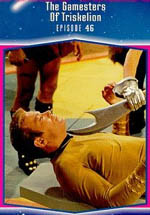
|
This is a real turkey of an episode, primarily due to the
plainness of the cliché capture and escape routine that
is unimaginatively stretched out to be the entire plot of the
story. It could be told in 15 minutes, but we're left watching
a lot of padding that inflates it out to 50. The technological
dominance that the Enterprise and her crew suffer under seems
completely unbelievable and poorly worked out, existing only
to maintain a silly plot.
Ho hum. I am pleased
to see that there is a minor Andorian character in the final
portions, as they seem to feature all too sparsely in original
Trek.
This episode is only included here due to one off-hand remark
that Kirk makes to the brains near the end. When he challenges
them to train the Thralls into becoming a self-sufficient
society, he taunts them by saying that his own people do that
with other cultures all the time.....
|
Huh? And here I thought they forbade themselves from doing that
with their greatest law, the Prime Directive? Something doesn't
quite add up here. Perhaps Kirk was just making things up to get
the brains to take his bet.
Oh well, it's not as if this is a shining example of Star Trek that
fans will study often. After "A Private Little War", this is
probably the second worst episode of season two, and worse than
anything from the first season.
A Piece of the Action
(Star Trek story #49 in production order)
story by David P. Harmon
teleplay by David P. Harmon and Gene L. Coon
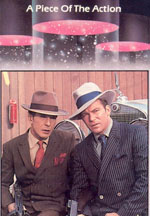
|
Sigma Iotia Two - an interesting name for a planet, because it
isn't quite the corruption of Bayer Star Notation it at first
appears to be. Though it sounds like two Greek letters pulled
from the air at random combined with a number, the second is
NOT the letter iota. It sits in the correct position for the
genitive form of the name of a constellation. While "Iotia" does
not correspond to any of the known 89 constellations popular
in Earth astronomy, it is reasonable that Starfleet travels
to stars better identified by the astronomy of other civilizations.
Perhaps "Iotia" refers to a constellation best identified and viewed
from within the Vulcan star system.
At any rate, the inhabitants of this week's new civilization
become known as Iotians. Perhaps it's a bit too ostentatious
to name them after an entire constellation, but then precedent
has already been set with the Orions....
|
|
Essentially, yet another Prime Directive driven story is told
while only referring to it as a "non-interference" directive.
Refreshingly, a previous ship interacted on Sigma Iotia Two
before the law came into being, and so the Federation is
already involved, and simply needs to put its best foot forward.
Nice.
Another nice touch is the idea of the Iotians being imitators
who have information on our own past - much more believable than
Hodgkin's Law of Parallel Planet Development, and working
much better than any time travel conundrums.
And to Kirk's credit, he and his crew proceed with openness and
honesty throughout their first contacts with the inhabitants.
Things don't go quite to plan, as their hosts have other ideas
they feel strongly about.
|
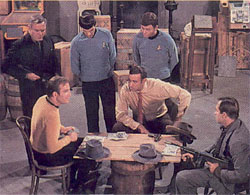
|
|
Sadly Kirk and company still have an end goal of manipulating the
Iotian society back onto the track they believe the earlier ship
knocked them off of. The end solution is charismatically delivered,
but not all that well thought out. It is vastly unclear how,
if at all, it will achieve either the manipulation they set out
to accomplish, or how it will set a precedent for the kind of
interaction the Federation would wish to pursue.
|
Anyway, despite the violent nature inherent in the subject matter
defining this society, the episode is clearly designed to be as
much a load of fun as possible, and it largely succeeds in this
area at least. Kirk and his crew's right to get involved and
do something for this society is well supported in the writing,
and despite their solution being a bit hokey, they don't do too
badly in the end. All this will allow "A Piece of the Action"
to come out as a better episode, and a better use of the Prime
Directive, than the more obvious Prime Directive stories like
"Bread and Circuses" and "A Private Little War". Good show.
No wonder this one was broadcast first in late season two's
sequence of Prime Directive stories....
|

|
|
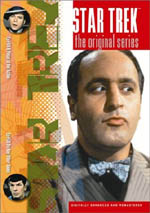
|
Patterns of Force
(Star Trek story #52 in production order)
written by John Meredith Lucas
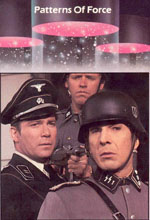
|
This story is quite similar in its main concept to many of the
parallel society Prime Directive stories of late season two,
particularly "A Piece of the Action", yet has a few nice new
twists in it too. This week's parallels have been brought about
yet again by previous Federation influence from a prior ship's
exploration, and turn out to be more intentional than those
of "A Piece of the Action" when the "non-interference directive"
should have guided Federation personnel better. And it is
up to Kirk and co. to "fix the mess".
Some of the nicer touches in the episode are the ones that
define the new civilizations of the week in ways that make
it not so parallel. Involving a second planet that has
interplanetary space travel is a very nice touch, indicating
that the jurisdiction of the Prime Directive may be about to
expire before long. The episode opens with a very nice optical
shot, adding an extra planet to a scene we've seen many times
before. There are plenty of other unique societal developments
listed throughout the show helping to flesh out these societies
and give them needed dimension which are great to see and hear.
|
|
But ultimately, these all get overshadowed by old, jaded,
Nazi symbolism which, despite a few balancing comments,
doesn't really rise far enough above the usual clichés
to make satisfying viewing. The complete overwhelming nature
of brutality, callousness, and torture displayed here seems
too inhumanoid and too unreal to be anything more than
an attempt to justify any policy the Zeons want to employ,
and they don't really come out of the adventure demonstrating
any of the peacefulness they reportedly had. "Patterns of Force"
feels like typical western propaganda most of the way through,
and out-of-place propaganda coming from Star Trek.
|
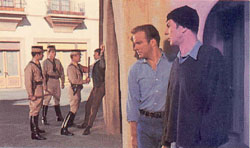
|
Overall the story structure is fairly good, but could have improved
had the torture idea been left out, being both a dynamic that
makes poor viewing material and being too cliché on top.
The capture and escape routine surrounding
it might also be replaced by something more interesting and
better balanced, but thankfully this section is kept short.
|
The final stages on the planet do work well though, and provide
some quality action and drama that is also fairly unique for a
Star Trek episode. At one point, a solution that would help
the Zeons is offered, and it is refreshing to see Kirk reject
this instantly with the reasoning that they also need to help
the Nazi-emulating Ecosians as well. Brilliant. If this kind
of thinking had only prevailed back in "A Private Little War",
that episode probably would not have ended up in such
ridiculous shambles.
John Gill's final resignation scene makes
a compelling and moving endorsement of the non-interference
directive that is easy to agree with and buy into. Yes, it
would have been better than what happened here.
|
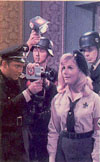
|
The coda attempted between our trio of regulars back on the
ship muddles the arguments once again though. If the Federation
would simply learn to give up attempts to manipulate
and control it would be so much farther ahead. Presenting
itself honestly and allowing other people and other civilizations
to shape themselves as they see fit would be so much easier
and more effective.....
All in all, this is a fairly good episode, treating its subject
matter with more seriousness than "A Piece of the Action",
and having a more successful and believable resolution. But
ultimately it will have to take a more serious hit for being
too literal with its Nazi symbolism and too stereotypical
in polarizing the attitudes of its opposing forces to ring
true to the alien civilizations it means to portray.
A good effort, but Star Trek deserves slightly better.
The Omega Glory
(Star Trek story #54 in production order)
written by Gene Roddenberry
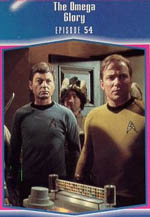
|
Finally, after more than two years of production, the last of the
three candidate scripts for the second Star Trek pilot gets
made into a viewable TV episode. Gene Roddenberry actually takes
the sole writing credit, something that only ever happened
on the first pilot "The Cage" and its two-part mutated form
"The Menagerie". Such rarity may help this episode to reveal a more
pure version of what the legendary man was really all about
than any of the many other episodes which he co-wrote with others.
"The Omega Glory" shows a vast array of strengths early on,
quickly becoming an extremely exciting and thought-provoking
adventure - the epitome of good Star Trek. It is a huge pity
that it was then saddled with such a ridiculous clunker of
a conclusion, dragging its overall rating back down into
the dank doldrums of the bottom ranks. What is possibly
Roddenberry's biggest blind spot in human values is laid bare
for all to see.....
|
The opening scene on the Enterprise probably would have worked
better had it used a typical Captain's Log entry, as the
exposition we have to wade through to get the characters'
motivations is pretty bland. One can easily imagine these
first few pages of the script being typed up before the Captain's
Log idea had crystallized in the producers' minds, and well before
computers and word processors had made script alterations as
painless as they are today.
Once past this though, our main characters embark on a compelling
investigation that takes them through a rich tapestry of
fascinating sci-fi and social concepts, new environments, and
a variety of action sequences, all the while raising stakes,
adding tension, and gradually peeling back the layers of
mystery both for the planet and for Captain Tracey and crew.
Much of what is taught in screenwriting classes is embodied
in Roddenberry's shining example here. The first 2/3 of the
story continues in this excellent vein.
And of all the stories produced up until this time, this is the one
that clearly wanted to introduce the idea of the Prime Directive,
having all the proper expository dialogue (albeit cleverly
disguised as philosophical debate) to detail what the Prime
Directive is, and how it will come to be at the center of
this week's adventure. Sweet. The argument is also one of
the strongest ever in favour of the Prime Directive, particularly
because the violation discovered has to do with spreading
weapons technology and engaging in local wars. But how many of us
would choose to act differently from Captain Tracey, given the
crushingly difficult
circumstances he was faced with? The choices are not so easy,
and can continue to provoke substantial thought even today.
Firstly on Captain Tracey's part, I think the key to more
enlightened choices must lie in being able to see past the
propaganda of the opposing local factions. The Kohn people
do not turn out to be all that less savage or more civilized
than the Yangs; they are actually quite similarly silly.
Note the brutal beheading the Kohns are in the process of
committing as Kirk and company beam down.
Had Tracey taken the Prime Directive more seriously, or simply
had a more spiritual head on his shoulders, he could have
assumed this probability from the beginning and should have
spotted the tell-tale signs to support it as he learned more
from his experiences. Had he not taken sides, he would have
had no one to give weapons to.
Self-preservation is perhaps another area. Roddenberry really
forces this to remain in the shades of grey by taking away
all chances of letting Tracey retreat harmlessly back into his
own society. Tracey really is forced to interact and integrate
himself. And if his Prime Directive violation had been of
the "love-thy-neighbour" type of spiritual leading-by-example,
I think it would have been worth supporting.
Kirk's options are even more confounded. He is not only
faced with conflict between Kohns and Yangs, but also one
between Tracey and the laws of Starfleet that may not be
the most well-thought-out. If only he could stand aloof
from Starfleet's prosecution of Tracey.... but as Spock
points out, the laws will find Kirk equally guilty if
he does nothing. And so Kirk and his crew are put in
the role of policemen. Any doubts about Tracey's guilt
are quickly put to rest by the deadly cover-up Tracey exhibits
early on.
But I think Tracey really deserves to be arrested for multiple
murders more than anything else. If the Prime Directive was
so precious, just why exactly did he come down to the village
and openly try to arrange for his crew to conduct a survey?
If that much is okay, as it probably should be, it is already
enough interference to possibly alter the course of advancement
for the planet's people. So good. Deal with it. And if it is
also wise to not go handing out advanced phasers to a primitive
and quite violent culture, make a law about weaponry and arms
technology, rather than silly blanket ideas of where evolution
should or should not take a species. Be yourselves, Starfleet,
and use good common philosophical sense.
Curiously, Tracey introduces greed and monetary gain as one
of his motives. This is bizarre if one follows through on
the premise that Federation society does not use money.
If they had all overcome the need to measure each other's
contributions to society and simply offered their services
freely in an attempt to continually better themselves, surely
an extremely experienced Captain like Tracey would not be so
easily lured back into that trap.
Even towards the end of its excellent streak, the plot of
"The Omega Glory" starts to stretch credulity a little.
Captain Tracey begins to remind me of many of the villainous
forces in Malcolm Hulke's Doctor Who
stories (season eleven's
"The Dinosaur Invasion" (story no. 71)
immediately springs to mind, although
"The Sea Devils" (story no. 62) and
"Frontier in Space" (story no. 67)
are equally valid examples),
where no matter how much more likely it is that the
good guys have numbers or circumstance or logic on their side,
the villain always manages to show up in the right place at
the right time to thwart their plans, knock them back to
square one, and stretch the plot out a little longer.
However it is the inexplicable exact duplication of the American
Flag, and later the U.S. constitution, that kills the excellence
of this story and makes Roddenberry's writing appear extremely
foolish and misguided. Had this been an episode of
"Sliders", that series' staple of
duplicate Earths across parallel dimensions would make the situation
on Omega 4 easily acceptable. But we don't have any of that here.
Roddenberry has made good use so far in the script of a planet with
similar development to Earth, yet one that took a different turn
at a critical point. No problems with that idea. But one should
expect such a planet to have its own unique cultural idiosyncrasies
and symbols. Its national and ethnic divisions should be
different, with their own unique names and flags. And no matter
how similar their national mission statements and constitutions
are to any found on our Earth, one should not expect to find
such documents exactly like ours, word for word, written in the
same language and font. The universal translator seems to be
out of a job in this tale. At least this planet seems to have
its own unique continents, unlike the equally unnecessary
duplication in "Miri" (Star Trek production #12).
Of course, in science fiction, all this could just be another
plot point, deepening the mystery and raising extra questions.
Perhaps there was another Prime Directive violation further
back in this planet's history, or another valid reason for
Earth's culture to be duplicated here so exactly. If so,
great! Bring it on. But Roddenberry totally ignores this,
and our regular Star Trek characters seem to be playing with
less than a full deck for failing to notice this and make it
an important part of their investigation.
In fact, Kirk's presumption towards this planet's culture becomes
an ugly, embarrassing, and blatant display of Roddenberry's
American chauvinism. Don't get me wrong; the American constitution
is a great document, and the spirit behind it should be reawakened
in its citizens who have forgotten its meaning, and it should be
shared proudly and openly with any civilization that may be inspired
by it. But this is not America on planet Omega 4. Neither Kirk's
crew nor Tracey's have spent enough time here to know exactly what
this culture is yet. And the real sin is that they don't make
any effort to remain open to learn how it might be different.
Kirk loses all credibility in discussing philosophy and ideals
by attempting to pull THEIR ideas in THEIR exact words out of
HIS OWN memory. This unquestioned assumption that "their goodness
must be exactly like ours" shows a complete lack of respect for
their culture, as much by Roddenberry as by Kirk and crew.
And isn't respect for other cultures what the Prime Directive
is really supposed to be about in the first place?
"The Omega Glory" fails in another important way as well.
Philosophy is intended to be the battleground upon which
Kirk proves his supremacy over Tracey in the eyes of
Cloud William and his tribe of Yangs (not to mention
even more importantly in the eyes of us viewers). When Kirk can't
remember all the exact English and Latin that he arrogantly
assumes is identical in the scriptures on Omega 4,
he convinces Cloud William that his victory in a one-on-one
knife fight to the death with Tracey will equally prove that
he is the good guy. Have you ever heard of anything more
ridiculous in your life? And it all comes from a writer
revered for putting philosophy at the forefront of good
science fiction. Hmmm. Yes, a knife fight at this point is
ridiculous, but it's also a re-run. We've already witnessed Kirk
and Tracey go at it in hand-to-hand combat at least twice before
in this episode, so by the time this latest fight ensues,
it really is a tired event - and no longer peppered by the
phaser effects that made the previous battles so much cooler.
There has been no build-up of
anticipation for such a contest; it feels instead as though
common sense has been slapped in the face with a wet fish.
The story doesn't escalate here;
it drops through the floor. If only Kirk could have stuck to
the philosophical battleground, and gotten it right.
Where are Captain Picard and the Next Generation writers
when you need them?
Even with such sadly unbelievable and unsatisfying methods
in the final portions of the story, many important goals are
successfully accomplished throughout. Kirk and his crew
manage to isolate the cure for the water reduction disease,
they rescue/arrest Tracey, and they make it back to the ship.
The conflict between Kohns and Yangs comes to a temporary
cessation via the overwhelming dominance of a massive Yang attack,
and Kirk and co. look as though they are making this more
permanently peaceful and respectful by inspiring the Yangs
philosophically.
One can easily be lulled into believing
that Kirk's charismatic moment (pointing out that the words
of the Yang/U.S. constitution must apply to everyone)
will help Cloud William and the Yangs respect the Kohns
instead of thinking that they are just for killing. That certainly
is the feeling emanating from the moment. But if they do take
that lovely meaning, they didn't get it literally from the words.
Kirk only speaks the first sentence of the constitution, barely
audible over a crescendo of music as though one is meant to get
swept up in the emotion of the moment and not really
examine the wording too closely. That first sentence
is very specific to the formation of a union of the states of
America, and contains oxymorons like "secure the blessings
of liberty".... Security and liberty are such natural opposites
that this phrase reeks of conspiracy designed to take liberty away,
and convince people to act in opposition to liberty all the while
believing that they are actually promoting and enjoying it.
More importantly, having the Yangs apply the words of the
formation of the union of the states of America to the Kohns
leads easily to the idea of the Yangs claiming Kohn territory
to be a part of that union, and forcing this ideology upon them
whether they agree with it or not. Instead of respecting their
old enemies, the Yangs could easily come out of this adventure
philosophically empowered to carry out the opposite. More
conspiratorial oxymorons.
And Kirk does recognize that other cultures throughout the
galaxy have come up with ideas and documents similarly great
to the U.S. Constitution, after which he wants to declare
that the U.S. said it best. Lots. Unless this show remains
open to better itself, everyday, no matter how good the last day
was, it will be philosophically surpassed. That goes for the
U.S. Constitution, and it goes for the Prime Directive as well.
Violating the Prime Directive to
help resolve the conflict between Kohns and Yangs
and bring peace
is a good heroic gesture - but it's hard for any
non-American to look at this and believe Kirk accomplished it.
Whatever good philosophical points he actually may have made
are deeply overshadowed by American symbolism and the idea of
America dictating its ideals to the rest of the world/galaxy.
Kirk is too eager, biased, and himself misled
to have made a better choice than following the Prime Directive
to the letter, while simply being himself and acting on his
own philosophy instead of preaching it may have been the best
course of all.
In the end, not only does the Prime Directive seem less than
ideal here, and not only do Kirk and his crew violate it,
they don't even manage to offer a more heroic or sensible
or respectful solution. While "The Omega Glory" deserves
much mention for an excellent beginning that introduces
and showcases the Prime Directive properly, it ends in
a complete disaster for philosophy, sci-fi credibility,
and action-adventure originality.
And strange it is too, that practically all of original
Star Trek's memorable Prime Directive stories were produced
before the story designed to introduce it. Now that it has
been so definitively unveiled, the rest of the original Star Trek
series lets the idea rust in peace....
The Prime Directive Stories of Season Two,
ranked from best to worst:
- Mirror, Mirror
- Who Mourns for Adonais?
- The Apple
- A Piece of the Action
- Patterns of Force
- Friday's Child
- The Omega Glory
- Bread and Circuses
- The Gamesters of Triskelion
- A Private Little War
Read the next Star Trek review:
"Assignment: Earth"
These Season Two prime directive stories
are available on DVD and Blu-Ray.
Click on the Amazon symbol for the desired disc format
and location nearest you for pricing and availability:
Star Trek Season Two "Purist" Standard DVD Box Set:
|

|
Watch the legend continue to develop through its prime.
Set contains all 26 episodes from the second season
in their original wacky broadcast order,
plus new bonus features.
As someone interested in researching how the episodes
actually looked and sounded originally, and when and
exactly how certain musical cues first debuted,
this was the DVD set for me, and it remains the most
untampered-with full-season collection of Star Trek
out there. Unique extras include pure text commentaries
on select episodes.
Sadly, these sets are starting to
become rare, and prices are now rising as these
become collectors' items....
|
DVD U.S.


| DVD Canada


| DVD U.K.


|
Standard DVD Extras include:
- To Boldly Go... Season Two featurette (20 min.)
- Designing the Final Frontier featurette (22 min.)
- Writer's Notebook: D.C. Fontana (8 min.)
- Kirk, Spock, & Bones: Star Trek's Great Trio (7 min.)
- Nichelle Nichols - Divine Diva (13 min.)
- Life Beyond Trek: Leonard Nimoy (12 min.)
- Text Commentaries on
"Amok Time" and
"The Trouble with Tribbles"
- "Red Shirt Logs" Easter Eggs (8 min. total)
- Production Art & Photo Log (still menus)
- Original Trailers for every episode (1 min. each)
|
|
|
|
The Original Series Remastered Sets
The re-mastered Star Trek set for season two,
like that of season three, seems destined to be obsolete
in very short order. Its content is easily surpassed
by the more respectful presentation on Blu-ray, and unlike
the "purist" DVD release listed above, appears to have none
of its own exclusive content. Add to that the very gimmicky,
awkward packaging that is prone to damage both during shipping and
with light usage, and I'd have to recommend that all devoted Trekkers
should consider other options for their ideal TOS season two product.
|
|
|
|
|
Season Two - Blu Ray
|

|
26 episodes @ 51 minutes
Star Trek sets are now available on Blu Ray.
Picture and sound quality restoration has gone up yet
another notch since the remastered version, as have the
liberties taken with "upgrading" the episodes.
Once again, even newer CGI effects and optical shots have
replaced many space scenes, matte paintings, and phaser
effects.... but this time the upgrades have the same respect
and user-functionality applied to select
Doctor Who DVD releases since 2002,
as the CGI effects can now be turned off to see the original
effects. Good show. It seems that the music
has still been tampered with too much for my liking though.
|
Blu-ray U.S.


| Blu-ray Canada


| Blu-ray U.K.


|
Blu-ray features add:
- option to watch original or new CGI effects.
- Audio commentary on "The Trouble with Tribbles"
by writer David Gerrold.
- Starfleet Access - Okuda interactive trivia
plus picture-in-picture interviews
on 2 episodes:
- "Amok Time"
- "The Trouble With Tribbles".
- Behind-the-scenes 8mm home movies part 2 (HD, 12 min.) from
Billy Blackburn (Lt. Hadley / DeForest Kelley stand-in)
- Star Trek TOS on Blu-ray (HD, 10 min.) restoration and upgrade featurette.
- Star Trek's Favorite Moments (SD, 17 min.)
- Mobile-Blu Content-To-Go Exclusives:
"Creating Chekov",
"Listening to the Actors"
"Writing Spock"
"Spock's Mother"
- "More Tribbles, More Troubles" with commentary
from the animated "Season 4" DVD box set.
-
"Trials and Tribble-ations" in HD this time,
with
two featurettes from the DS9 season 5 DVD box set.
- plus all documentaries, featurettes, and episode promos
from the "purist" standard DVD set listed far above.
|
Reviews written by Martin Izsak.
Comments on this article are welcome. You may contact
the author from this page:
Contact page
|

LYRATEK.COM
|
|
|





























